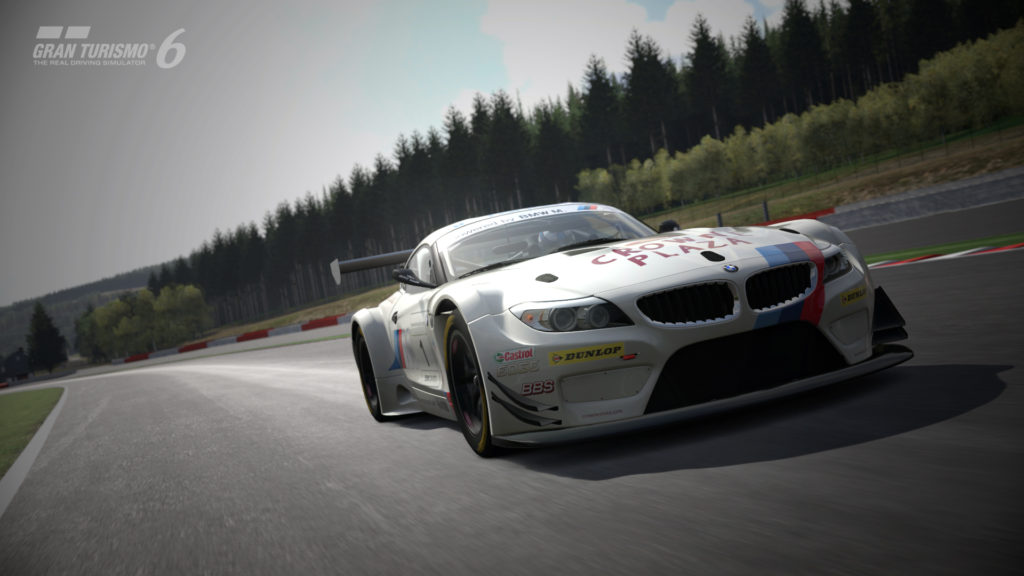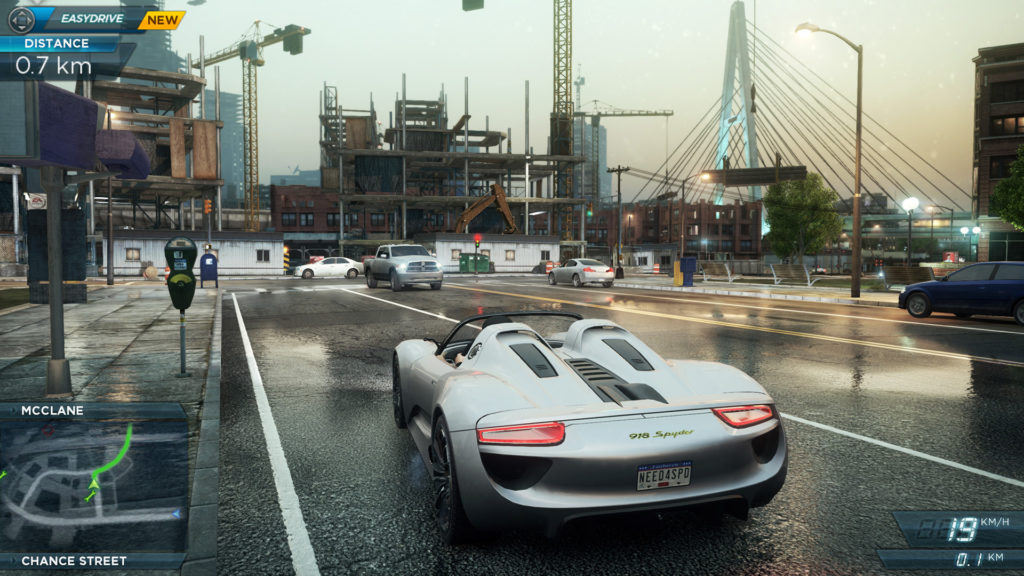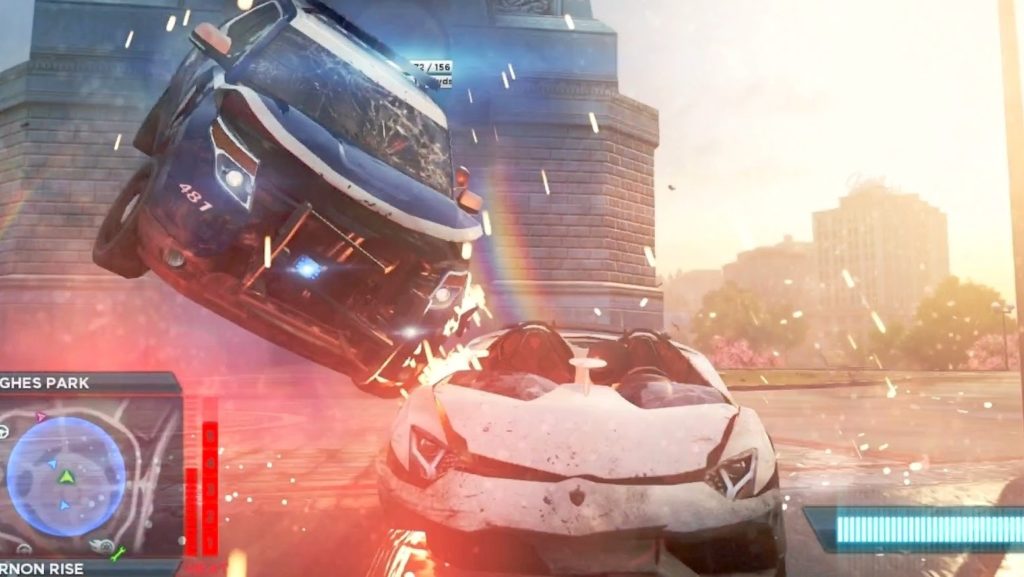I played two racing games that could not sit further from one another in the “racing” genre spectrum. As you might note, I’m kind of obsessed with these games because of the purity of their systems – all you need to know to play them effectively in most cases is “gas, break”, and the ability to steer towards being first place. They sound simple, but the nuances reveal a lot about a developer’s intended experience and priorities.
First up: Gran Turismo 6. Sony’s driving simulator series somehow only produced 6 mainline entries in fifteen years (moving onto eighteen until Gran Turismo Sport eventually appears), and yet the game remains relatively the same. Race realistically rendered cars in real locations with realistic physics – a simple premise, no? Polyphony Digital’s continual attention to detail and a love of car history keeps players coming back for the continual feedback loop of winning races, buying cars, and winning yet exceedingly harder races. I liken it to a “CaRPG”, the literal car-driving equivalent of a JRPG – just, the grinding in this case involves a billion different races to win cash and buy cars rather than killing enemies for money and treasure.

I’m not sure if I exactly love simulation games – sometimes, the slavish attention to real-world detail gets in the way of fun car racing experiences, I find – but Gran Turismo saddles the line between realism and arcade fun. I don’t use a steering wheel, just a normal PlayStation control, and the game works just fine for me. For those who don’t understand racing lines, the game offers that as well so that you can mindlessly follow a blue line through courses. Me? I turn that off, because what’s the point if the game’s going to tell me how to play it? Thankfully, Gran Turismo 6 doesn’t borrow Forza’s evil “rewind” feature which removes any need for consistency in a race. I get it, they want the game to be accessible to everyone, so at least it works for that purpose (and save time too).
However, Gran Turismo 6 turned surprisingly inaccessible to me when I received it in the mail yesterday. Apparently support continued for Gran Turismo 6 well into December 2015, and thus the game demanded I install 21 different updates, most of which contained at least 1 GB of data. Cue a long, protracted updating process. Further, to add to my frustration, the PlayStation3’s idle options came on to turn the system off after “inactivity” just a few minutes before the installation completed. I can’t begin to tell you how frustrating and awful this whole process is, and whoever designed the updating system here should be shot. To add insult to injury, I simply yanked out the Ethernet cord and played the game. Voila! Gran Turismo 6 runs fine with no installation, just racing. I don’t understand these decisions sometimes, but I imagine the game got booted out the door incomplete, and this update system proves the best solution – if not for consumers, than for Sony at least!

Long story short: Gran Turismo 6 is fun, but it lacks a certain…something. And that something is SPEED, and the real feeling of driving a race car at over 100 miles per hour barreling down a highway, trying not to die a horrible death by touching pretty much anything at that speed. Gran Turismo cars, for all their “realistic damage” and “simulation”, just kinda bounce off stuff; the car might drive different, but the damage looks mostly internal rather than external. It looks a whole lot like Ridge Racer, but while I expect that from Namco’s super fine drifting megamix, Gran Turismo doesn’t feel very realistic at a glance.
Enter Need for Speed: Most Wanted. I don’t check my Origin account often, but apparently I own this game. I think I got it for free on one of their “On the House” promotions, so I just decided to roll with it. Having spent the better part of a decade and a half not playing Need for Speed, it seems Criterion took the reigns of the series – that could portend nothing but good things, and I wasn’t disappointed.

As a sort of spiritual sequel to Burnout Paradise, Most Wanted does the whole “open world car driving” thing, with lots of tiny objectives, cars to find and upgrade, along with races to complete. I usually hate open world games like this – the idea that I would spend my free time playing video game completing all sorts of nonsensical busywork makes me cringe (see: any, and all, Assassin’s Creed games, or Ubisoft open world games for that matter (do they make anything else these days?)). Most Wanted certainly has plenty of that, and plenty of driving to certain location to take on certain missions/races/whatever.
But, it also contains something I haven’t seen in a pure racing game before: the cops! Taking a cue from Hot Pursuit (whichever one, the original or the reboot), driving too fast near a police car initiates a chase, with a Grand Theft Auto-inspired “Heat” meter that determines the severity of the cop presence on you. Doing lots of illegal things (like, say, t-boning a police car, or running straight through an SUV roadblock) heightens the Heat, while getting out of sight/range of cop cars will lower it. It’s a constant game of cat and mouse avoiding the entire brunt of a city’s police force while trying not to die in a horrible crash. And, just for fun, “winning” (i.e., “escaping”) gives you Wanted points, which gets you closer to some of the hardest races in the game.

Put simply, Most Wanted makes traveling from Point A to Point B fun, and that’s rarely true in open world games. The fact that the game also utilizes Criterion’s penchant for the crazy feeling of uncontrollable speed and drifting, along with the wonderful crash cam, just adds to the overall package. I’ve had more emergent fun in this game then I’ve had in a long time, and much of it comes down to how much fun it is to actually drive cars in the game!
I should say I don’t think either Gran Turismo 6 or Need For Speed: Most Wanted are better or worse than each other. They do very different things to the core idea of “racing cars”, but both go about it in an entirely different way. Both contain different ideas of “progression”, and both do a fine job of engaging the player. I prefer the insane lack of realism from Most Wanted, of course, but that’s just me – you might like driving racing lines and buying progressively better cars to win better races. I’m just surprised to see such variety in such a fundamentally simple concept!
Unity in diversity doesn’t seem so far-fetched in Christianity, to the point where our eschatological visions emphasize these differences! Just take a look at Revelation 7:
9 After these things I looked, and behold, a great multitude which no one could count, from every nation and all tribes and peoples and tongues, standing before the throne and before the Lamb, clothed in white robes, and palm branches were in their hands; 10 and they cry out with a loud voice, saying,
“Salvation to our God who sits on the throne, and to the Lamb.” 11 And all the angels were standing around the throne and around the elders and the four living creatures; and they fell on their faces before the throne and worshiped God, 12 saying,
“Amen, blessing and glory and wisdom and thanksgiving and honor and power and might, be to our God forever and ever. Amen.”
I guess that’s why it’s cool to see it in such stark form in video games: two great games taking the same concept and still achieving the same end – just from a different angle. The same goes for churches around the world, each with a different cultural concept (and denominations, don’t forget), coming to the same conclusions from a different angle. It’s just neat!
